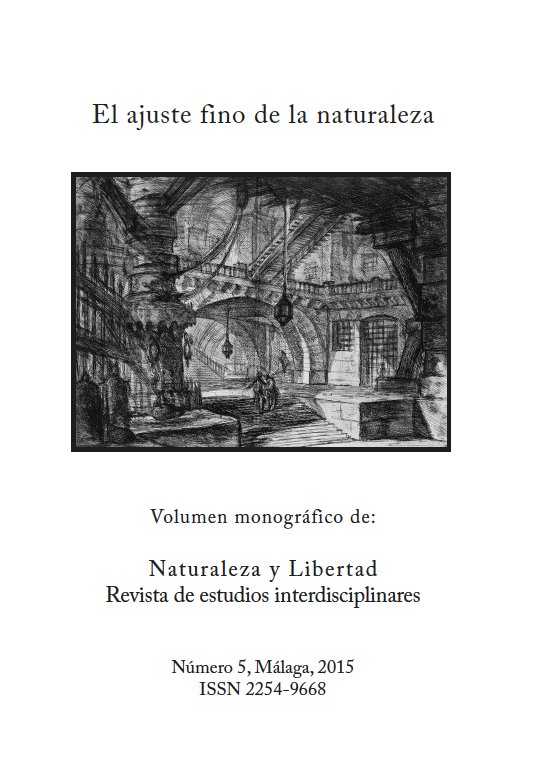Kant y Darwin. Crisis Metafísica
DOI:
https://doi.org/10.24310/NATyLIB.2015.v0i05.6326Keywords:
Finalidad de la naturaleza, libertad trascendental, ideas de razón, simultaneidad, auto-organización,Abstract
En la contienda entre neo-darwinistas y creacionistas son las ideas de razón, la idea de alma o sujeto pensante, la idea de mundo (libertad) y en especial la idea de Dios, las que hacen crisis y las que forman el ámbito de la metaphysica specialis kantiana. El principio reflexivo y regulativo de una finalidad de la naturaleza que Kant introduce en la
tercera Crítica no solo permite intervenir en la anterior contienda, sino que enlaza con la ciencia moderna y constituye el eje del sistema kantiano al mediar en el abismo entre naturaleza y libertad.
Downloads
Metrics
References
G. Bachelard, La Intuición del Instante, Buenos Aires, Ediciones SigloVeinte, 1973.
M. J. Behe, Darwin´s Black Box, The Biochemical Challange to Evolution, New York, Free Press. 2006.
L. von Bertalanffy, General Systems Theory-A Critical Review, New York, George Braziller, 1980.
I. Colón, La Aventura Intelectual de Kant, Sobre la Fundamentación de la Metafísica y de la Ley moral, Madrid, Editorial Biblioteca Nueva, 2006.
R. Dawkins, The God Delusion, New York, Bantam Books, 2006.
D. C. Dennett, Darwin´s Dangerous Idea, Evolution and the Meaning of Life, New York, Simon and Schuster, 1996.
Breaking the Spell, Religion as a natural Phenomenon, England, Penguin Books, 2007.
I. Kant, Crítica de la Razón Pura, Madrid, Ediciones Alfaguara, 1983.
I. Kant, Prolegómenos a toda Metafísica Futura, Buenos Aires, Editorial Charcas, 1984.
I. Kant, Crítica del Juicio Estético y Teleológico, Madrid, Espasa-Calpe, 1981.
I. Kant, Crítica de la Razón Práctica, Madrid, Espasa-Calpe, 1981.
I. Kant, Primera Introducción a la Crítica del Juicio, Madrid, Visor, 1987.
R. Kasper, “Los fundamentos biológicos de la gnoseología evolutiva”, en La evolución del pensamiento, Barcelona, Ed. Argos Vergara, 1984, pp. 117-136.
S. Kauffman, At home in the universe. The search for the laws of self organization and complexity, U.K., Oxford University Press, 1995.
Reinventing the sacred: a new view of science, reason and religion, New York, Basic Books, 2008.
J. L. Pinillos, Introducción a la Psicología Contemporánea, Madrid, Consejo Superior de Investigaciones Científicas, 1963.
I. Prigogine, ¿Tan solo una ilusión?, Barcelona, Editorial Tusquets, 1983.
I. Prigogine, Les Lois du Chaos, Paris, Flammarion, 1994.
I. Prigogine, I.Stengers, La Nueva Alianza, Madrid, Alianza Editorial, 1983.
R. Riedl, Biología del Conocimiento, Barcelona, Ed. Labor, 1983.
M. Ruse, Can a Darwinian be a Christian, the Relationship between Science and Religion, NewYork, Cambridge University Press, 2000.
Downloads
Published
How to Cite
Issue
Section
License
Those authors who have publications with this journal, accept the following terms:
1. Copyright and licensing information are clearly described on the journal’s web site: all content published in Naturaleza y Libertad is open acces without limit, and are subject to the Attribution-NonCommercial-ShareAlike 4.0 International (CC BY-NC-SA 4.0) license. The full text of which can be consulted at https://creativecommons.org/licenses/by-nc-sa/4.0/
2. It is the responsibility of the authors to obtain the necessary permissions for the images that are subject to copyright. The authors whose contributions are accepted for publication in this journal will retain the non-exclusive right to use their contributions for academic, research and educational purposes, including self-archiving or deposit in open access repositories of any kind. The electronic edition of this magazine is edited by the Editorial de la University of Malaga (UmaEditorial), being necessary to cite the origin in any partial or total reproduction.
3. This journal allows and encourages authors to publish papers on their personal websites or in institutional repositories, both before and after their publication in this journal, as long as they provide bibliographic information that accredits, if applicable, your posting on it.
4. In no case will anonymous papers be published.





18.png)













